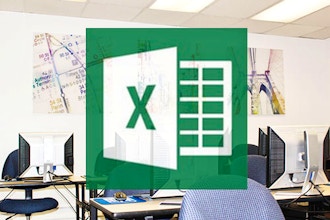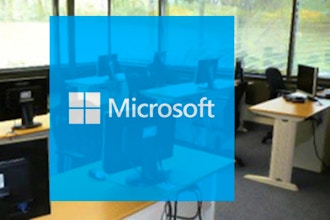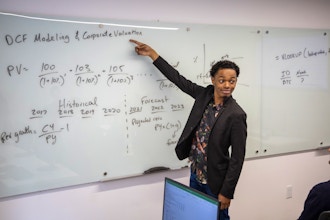Best Finance Classes in Seattle
Finance is a broad field that involves managing money for an individual, an organization, or a government agency. Finance professionals perform various activities, such as budgeting, investing, borrowing, lending, or saving money. Finance comprises activities like investment banking, financial engineering, risk management, and stockbroking. Those who work in finance typically focus on one of three areas. Personal finance involves managing a single family or individual’s finances, such as advising them on investments to make during their career or preparing them for retirement. Corporate finance professionals oversee a company’s finances. They are hired to help their organization make the most profit off of investments while being cognizant of risks. Individuals with public finance jobs work for a government entity and are tasked with monitoring how it shares resources and distributes social programs and income. They also study the economy to be informed of fluctuations.
Studying finance can open many professional doors and lead to high-paying career options. Those who know how to manage money have job opportunities in many industries, such as education, advertising, tech, or consulting. Finance professionals are also in a position of power within their organization; these individuals are trusted with making some of the most important decisions a company or individual can make since they pertain to money. The field of finance is in a constant state of evolution and has grown well beyond traditional big banks. Those with the training and skills to understand the ins and outs of finance play an integral role in this ever-changing field and often work with new technologies and banking, such as mobile deposits, cryptocurrency, and fintech. Not only will a background in finance help in a current job, but finance skills are transferable. The analytics training finance professionals acquire in how to leverage quantitative data to solve problems is a skill that can help in various business settings. Additionally, finance training has applications for personal fiscal well-being and can help individuals make more informed investment choices and more conscious budgeting efforts.
Best Finance Classes & Schools in Seattle
A great way to learn more about finance is to explore finance classes in Seattle. The following sections will take a look at some current class listings for those who live in the Seattle area and are interested in studying finance, as well as the course content and tuition.
NYC Career Centers - Financial Modeling Bootcamp
Financial Modeling Bootcamp provides an overview of corporate finance and accounting. This class teaches students how to create financial models like the discounted cash flow model, which can be used to evaluate an investment. This class begins with instruction on advanced Excel functions, like IF statements and VLOOKUP. Students then learn Excel shortcuts for creating financial models and essential Excel functions like cash flow projection tools. In the corporate finance and accounting class component, learners explore core enterprise value concepts, financial statements, stocks and bonds, and corporate valuation. Best practices for financial analysis are also taught in this bootcamp, such as tips and tricks to be a successful Financial Analyst. During this bootcamp, students create a financial model that can be included in their professional portfolios.
It costs $995 to enroll in this program. Coursework takes 18 hours to complete and requires three days of instruction. Those who don’t have prior experience working with accounting or financial concepts can study the free prep material, which is provided online by NYC Career Centers. Additionally, it’s helpful for students to have intermediate-level Excel for Business proficiency, such as knowledge of PivotTables, IF statements, and VLOOKUP. A free course retake is available to all students for up to six months. A supplemental refresher video suite is included with tuition. All participants can keep their custom workbook, which includes an overview of financial topics covered in this class. Participants in this bootcamp also prepare for investment banking interviews by exploring the most common concepts that may come up.
General Assembly - Excel Bootcamp: Formulas & Functions
Excel Bootcamp: Formulas & Functions is an intermediate-level course that teaches students to work with one of the most important tools for finance: Excel. Participants begin by exploring basic Excel skills, like writing formulas, utilizing shortcuts, and formatting, structuring, and analyzing data. This class then progresses into more advanced topics, such as absolute versus relative cell referencing, VLOOKUP, logic formulas, and PivotTables. This hands-on program also teaches participants the best practices for formatting spreadsheets.
This is a one-day program. Tuition requirements are provided by the instructor for those who enquire. Students can choose whether to take this class live online or to use the provided training facility in Seattle. As a prerequisite, those interested in enrolling should be familiar with the Excel interface and basic skills, such as how to copy and paste and work with a spreadsheet. Students can use their own raw data for exercises if they prefer or use the data provided by the instructor. This class is taught with a PC, but the features and functions will work on Macs, and shortcuts will be provided for both PCs and Macs.
Noble Desktop - Financial Analyst Training Program
Those looking to learn fundamental financial and corporate finance concepts can enroll in Noble Desktop’s Financial Analyst Training Program. Coursework begins with teaching students core Excel skills for finance, such as working with PivotTables, shortcuts, formulas, and functions. Students then progress into more complex Excel training and work with advanced Excel techniques like cash flow projection tools, Goal Seek, and financial functions. Instruction on valuation and corporate finance topics like financial statement analysis, enterprise value, corporate valuation concepts, and DCF modeling is provided. Participants also learn how to create a three-statement financial model for a public restaurant company and apply current financial data to this DCF model. Working with valuation principles, those enrolled calculate a value-per-share amount and determine the equity as a possible investment.
It costs $1,295 to enroll in this hands-on program. Tuition is due before the first class date. Coursework takes 30 hours to complete. Training is available in person in NYC as well as in the live online format. All students can retake this program for one full year at no additional cost. As a prerequisite, having a background working with finance and accounting concepts is helpful, though this is not required. Those who do not have this training can acquire it through a short pre-learning guide that will be emailed the week before class.
University of Washington - FinTech Boot Camp
FinTech Bootcamp is available for those interested in acquiring comprehensive fintech training. Participants in this program learn to work with several core tools, languages, and skills required to pursue a fintech career, such as blockchain, cryptocurrency, Python programming, and advanced trading algorithms. Throughout this class, students work to create professional portfolios that showcase their acquired fintech skills to employers.
Tuition for FinTech Boot Camp is $12,995. This bootcamp takes 24 weeks to complete at a ten-hour-per-week pace. Since this is a beginner-friendly program, no prerequisites are required. Instruction is provided in person in Seattle.
Seattle Industries That Use Finance
Seattle is home to many industries that contribute to its economy, such as technology, health services, construction, life sciences, and manufacturing. The following sections will examine several of the city’s main industries and the role finance plays in them.
Technology
Seattle is one of the world’s leaders in innovation and technology. This city has been a powerhouse in fields like gaming, software, artificial intelligence, and machine learning for decades. In 2021, over 13% of the Seattle metro area was employed in a tech-related career, such as web development, UX/UI design, or software development. That year alone, there were nearly 95,000 job postings in technology. Seattle’s tech industry has greatly impacted the city and generated $133 billion in 2021. This placed Seattle in a Tier 1 designation for tech talent, ranking alongside cities like NYC and San Francisco.
In the tech sector, finance is important in helping businesses, startups, and other organizations monitor their financial well-being. Fintech, which is short for financial technology, is a field that merges finance and technology and strives to automate and improve how financial services are delivered and used. Fintech helps companies and consumers manage their finances and financial operations. This field applies new technological advances to compete with those that were used traditionally to provide financial services. To do so, those who work in fintech employ tools and technology like AI, cloud computing, big data, and blockchain.
Construction
Another major Seattle industry is construction. The city’s construction efforts primarily focus on three aspects: buildings; highways, roads, and related infrastructure; and residential and commercial construction specialty trades. In the first quarter of 2022, 51 cranes were being used in Seattle, which was more than any other US city. These cranes were being used for large-scale construction projects. From the summer of 2022 till the summer of 2023, the employment rate for construction jobs in Seattle increased by 8,700 people. This trend is projected to continue due to a transportation funding bill that will allocate $17 billion during the next 16 years for a range of construction projects in Seattle. This funding will be used along with federal funding to support $4 billion for road and bridge construction, $4.3 billion for pedestrian and bicycle projects, as well as $1.5 billion to create a statewide ferry system.
Finance plays an important role in the construction industry. Construction financial management ensures that the appropriate financial resources are allocated to fund construction projects. Finance also plays a role in the construction loan process that is needed to fund many construction projects. Those who work in construction finance study topics like land and property equity and how this can be used as a down payment for construction loans.
Aerospace
The greater Seattle area is a space hub and is home to over 900 aerospace-related companies that employ nearly 100,000 people. Half of the satellites in operation that are orbiting Earth were created in Seattle. Over the past five years, the Seattle space economy has more than doubled due to increased aerospace sector activity, access to high-tech manufacturing resources, a talented workforce, and new IT assets. Aerospace remains a capital-intensive industry. To remain competitive with the latest technology and innovations, those working in aerospace often rely on financing aircraft using debt or equity financing. Large aerospace companies often employ Aerospace Financial Analysts to help them manage complex financial data and make informed decisions about expending resources and funds.
Finance Jobs & Salaries in Seattle
Seattle is one of the best places in the country to work in industries like software development and technology. The following sections will explore several career paths for Seattle residents with a finance background.
Aerospace Engineer
Aerospace Engineers are involved with developing technologies used in spacecraft, aviation, and defense systems. These professionals have high-level technical training in structural design, navigation, guidance systems, communications, propulsion and combustion, robotics, instrumentation, and aerodynamic fluid flow. These professionals also design and test the equipment on aircraft and spacecraft. They employ and integrate cutting-edge technologies into aerospace systems, which are then used for exploration, communication, transportation, or defense. In Seattle, Aerospace Engineers make $140,000 a year.
Project Manager
One of the main industries in Seattle is construction, and to successfully complete a large-scale construction project, Project Managers are needed. A Project Manager is hired by a company to organize, plan, and carry out one or more projects, such as building or apartment construction. These professionals must consider a range of variables and constraints, such as schedules, budgets, zoning regulations, and safety protocols. Project Managers clearly articulate the goals of a project, create and oversee teams to carry out tasks, communicate with internal and external stakeholders, and ensure a project progresses smoothly from conception to completion. Seattle-based Project Managers earn approximately $101,000 annually.
Software Engineer
Seattle has a thriving tech scene and provides professionals who work there with a range of opportunities to develop and grow. Software engineering is a popular field for Seattle residents. Those who work as Software Engineers devise solutions for web and desktop applications, games, operating systems, mobile apps, network systems, and robots. These professionals employ training with databases, programming languages, frameworks, and servers to perform daily tasks. Software Engineers are also tasked with monitoring how software is performing and fixing any bugs and errors they find in the software. They often work as part of a team to provide software users or clients with technical support and to design and code various software solutions. Software Engineers who work in Seattle earn a yearly salary of $155,000.





























